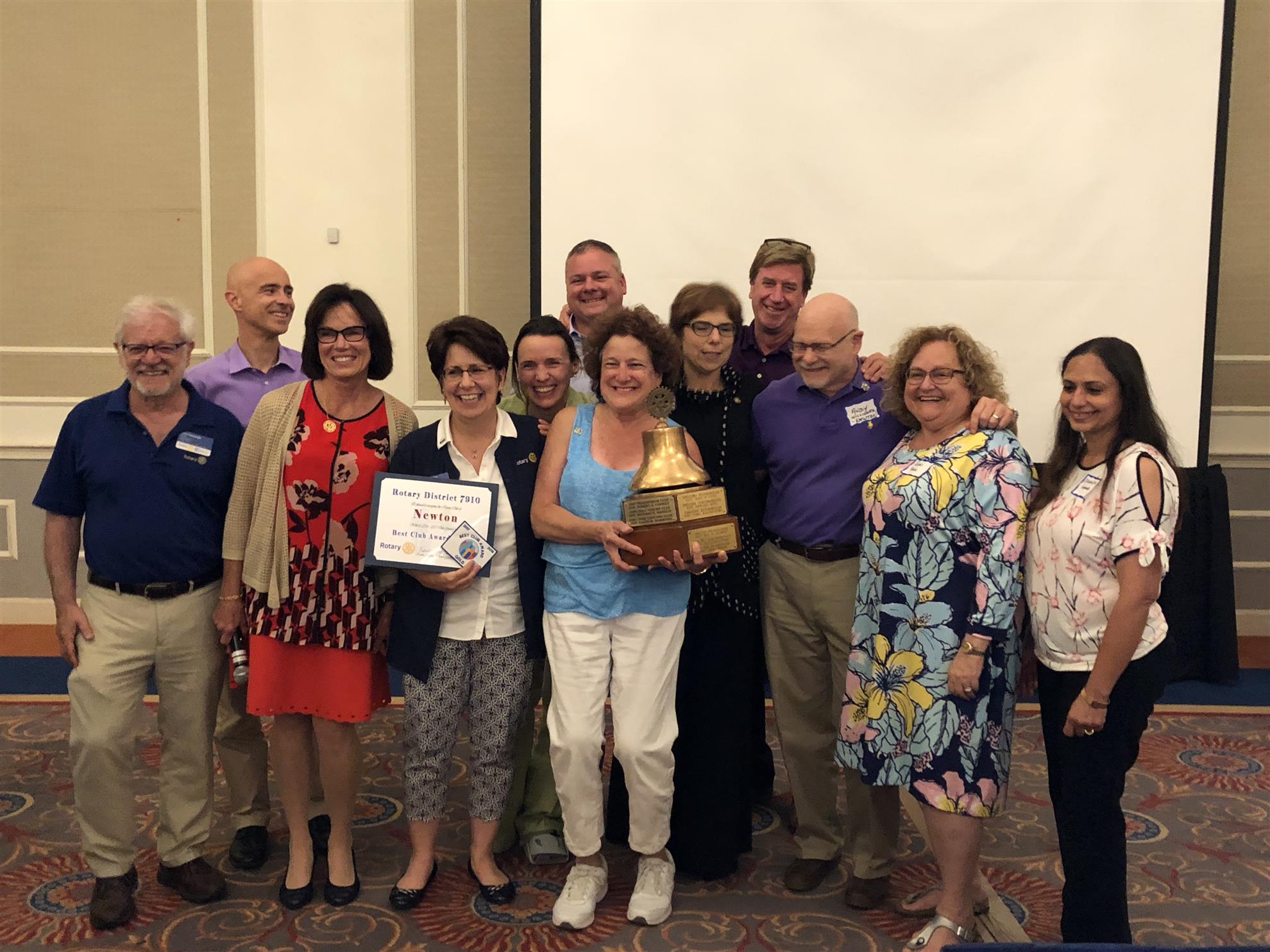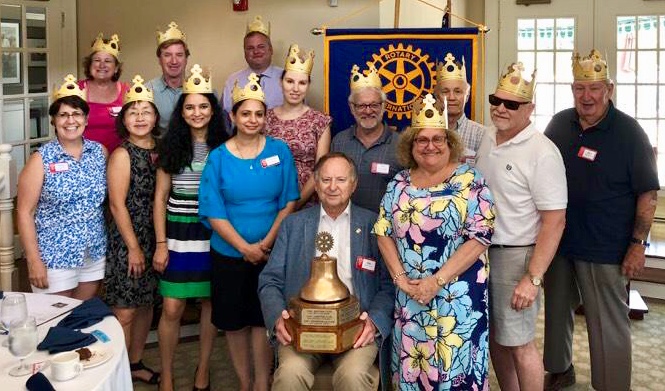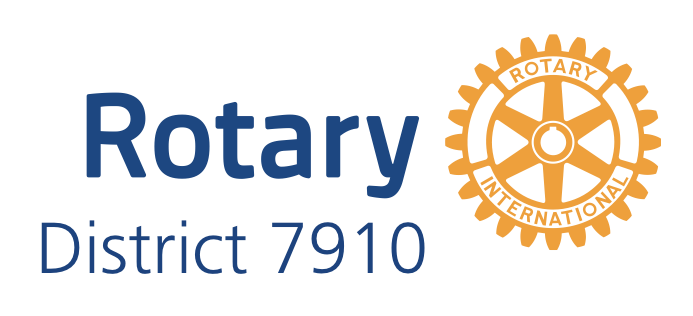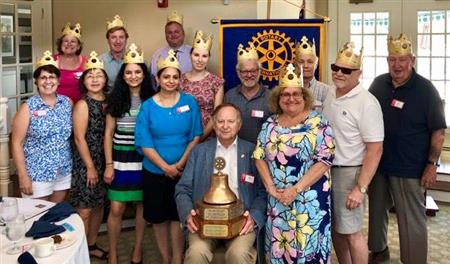HOW WE GOT TO BEST CLUB
By Susan Peghiny
Immediate Past President, Rotary Club of Newton
Winning the Gold Best Club for 2017-2018 was an incredible experience, and one that didn’t seem possible just a few years ago. Newton is an old club – we were established in 1926 – and had been know as a “check writing” club. That was a very good thing for a very long time - the club made a real difference in the lives of many people over the years. But the world was changing, and Newton Rotary had to evolve…to make ourselves more attractive to members, and to energize the existing membership. That journey happened to lead us to Best Club.

Why bother with awards anyway? Winning awards has never been important to our club. But it’s amazing how proud our members are of these achievements. To have your time and effort recognized and appreciated is a powerful thing. Our morale is incredible (great for going into a new year), and we’re using these “wins” as a marketing tool to attract new members and supporters.
So what did we actually do? Here are what I’d call “the biggies” that were key in moving us forward (along with suggestions on how you might apply them):
1. We didn’t set out to win Best Club - we set out to be the best club we could be. It wasn’t until RI notified us that we had achieved the Rotary Citation that I started really LOOKING at what we’d done and realized that maybe, just maybe, we would be in the running for a District award. But that was NEVER the goal – being impactful and making a difference were the main goals.
2. We kept track of what we did. Duh! This is SO simple to do but many clubs don’t bother. We used the tools available from the district and RI, and updated the information regularly. I put a reminder in my calendar to do this once a month – it took about 5-10 minutes each time. I think more clubs would win awards and be recognized if they just did this.
The D7910 Planning Guide is the first tool to check out. It got us thinking about what our club could do, and then it helped keep track of what we had done. It’s also the official form that needs to be submitted in June for a club to be considered for any award. If you don’t have it, contact your AG or me and we’ll get it to you, or you can download it from Rotary7910.org.
Important suggestion: I created a companion document to keep notes on what I’d already “counted” in the D7910 Planning Guide (I used Word, but use whatever application you prefer). For example, line 37 asks “Did your club have a Rotary article in local printed or online news media”. We had 6, but I kept forgetting which ones I had already counted, so I tracked this in the “companion document”. This kept me organized (and honest!).
Along with the D7910 Planning Guide I regularly updated the Goals Center and Service Activities Center in Club Central at Rotary.org. By maintaining THIS information, I was able to transfer quite a bit of it from there to the D7910 Planning Guide. AND this information is used by RI to determine if a club should receive the Rotary International Citation (formerly the Presidential Citation). There’s also info on your club members’ giving (which is relevant to the Membership, Rotary Foundation, and other sections of the D7910 Planning Guide).
Regardless of awards, I think it’s important to maintain this information because you’ll be building organizational memory for those who come after you. Keeping your Club Central data up to date is time well spent. Again – a monthly reminder makes this process extremely easy.
3. Visioning! The Visioning process changed everything for our club. For the past couple of years we were definitely becoming more active but, as I like to say, we were shooting buckshot. We wanted to become sharpshooters. Our club had no clear idea of what we cared about, or who we wanted to be. Visioning helped us figure some of that stuff out. It also reinvigorated our Committee structure, which in turn affected engagement and the entire energy of the club. Visioning does take some time (a 3-4 hour evening workshop followed by 1- 3 follow-up club meetings) but it’s worth it. If your club did Visioning previously and either want to do an update or weren’t that satisfied with the results, now is the time to revisit. The Visioning Team will be there to help you the entire time, and you’ll get more after-workshop support to help you finish the process.
An unexpected and very beneficial side effect of Visioning was that it taught us how to talk about difficult and uncomfortable subjects in a thoughtful, kind and collaborative way. This was especially important to our more tenured members, because it gave them the opportunity to explain why certain things (like our venue) were very important to them. Their concerns had an impact on the decisions we made, which we wouldn’t have heard without Visioning. Using these skills, we were able to make some significant changes in how our club operates, and we now feel very good about the future of Newton Rotary.
If you want to learn about Visioning, contact Ron Faccenda at rfac88@gmail.com and he’ll arrange a presentation at one of your regular meetings.
4. Our meetings have good energy, good speakers, and are welcoming to visitors. There are a lot of Rotary Clubs around us, so people tend to “shop clubs”. Our two newest members (neither of whom live or work in Newton) chose to join us because of our culture and energy. Even though our venue feels formal (no jeans!), our club culture is relaxed and welcoming, and we laugh - a lot. We’re interested in the people who come to our meetings. We ask questions of speakers, visitors and each other. Our speaker series covers a wide range of topics, from local and international non-profits to traditional boat building in Essex to backyard beekeeping. We want each of our meetings to be a social event, informative about club activities, and an opportunity to feed the mind. It’s a good value statement for attending.
We also changed some of the traditions of our meetings. I know this is a difficult and sometimes controversial issue for many clubs, but you have to look at your club from the eyes of an outsider. Better yet, get an outsider to visit and instruct them to honestly tell you what they saw and how it made them feel. Then decide if keeping a tradition is more important than growing (or maybe even saving) your club. For example, we’re terrible singers so this was a big turn off for visitors. Now we only sing occasionally for birthdays, which actually makes it more fun and a special event – and one that visitors understand.
7. We’re out in the community. Rotary Clubs have historically been pretty parochial and worked “behind the scenes”. That doesn’t work anymore – people need to know what we do (and they’re usually pretty darn interested, too). Our first step was having booths at local fairs. Then the club joined the Chamber of Commerce, and members now attend events as our representatives and participate on committees. We even sponsored a Chamber networking event. We’re collaborating with lots of city organizations, businesses and non-profits. This has really raised our visibility and image in Newton, and has increased our impact as well. Our corporate membership really helped with this, too. Most of our service projects are in collaboration with other organizations which makes for GREAT community building.
6. Our most important focus: service, service, and more service. When RI and D7910 started talking about hands-on service, our club listened and responded. As part of the Visioning process, we voted to do at least one service project every month. That turned out to be a pretty easy goal to achieve and probably tripled our annual service efforts. We started by volunteering at other organizations or events, but now we’re putting together our own unique projects. With the club’s support a couple of our members became drivers of the Rotary Addiction Prevention Seminar program. Our Community Service Committee does an amazing job, which helped with our Best Club and Community Service Awards. We consider this the most important committee in the club.
Our consistent service opportunities have also attracted new members and volunteers, and got our existing members more engaged. They helped our image in the community, AND are always so much fun!
There are probably a million and one “little things” we did to achieve Best Club, but the actions above feel like the foundation for everything else. Go for it! The gauntlet is thrown - I want YOUR club to try to beat OUR club next year!


